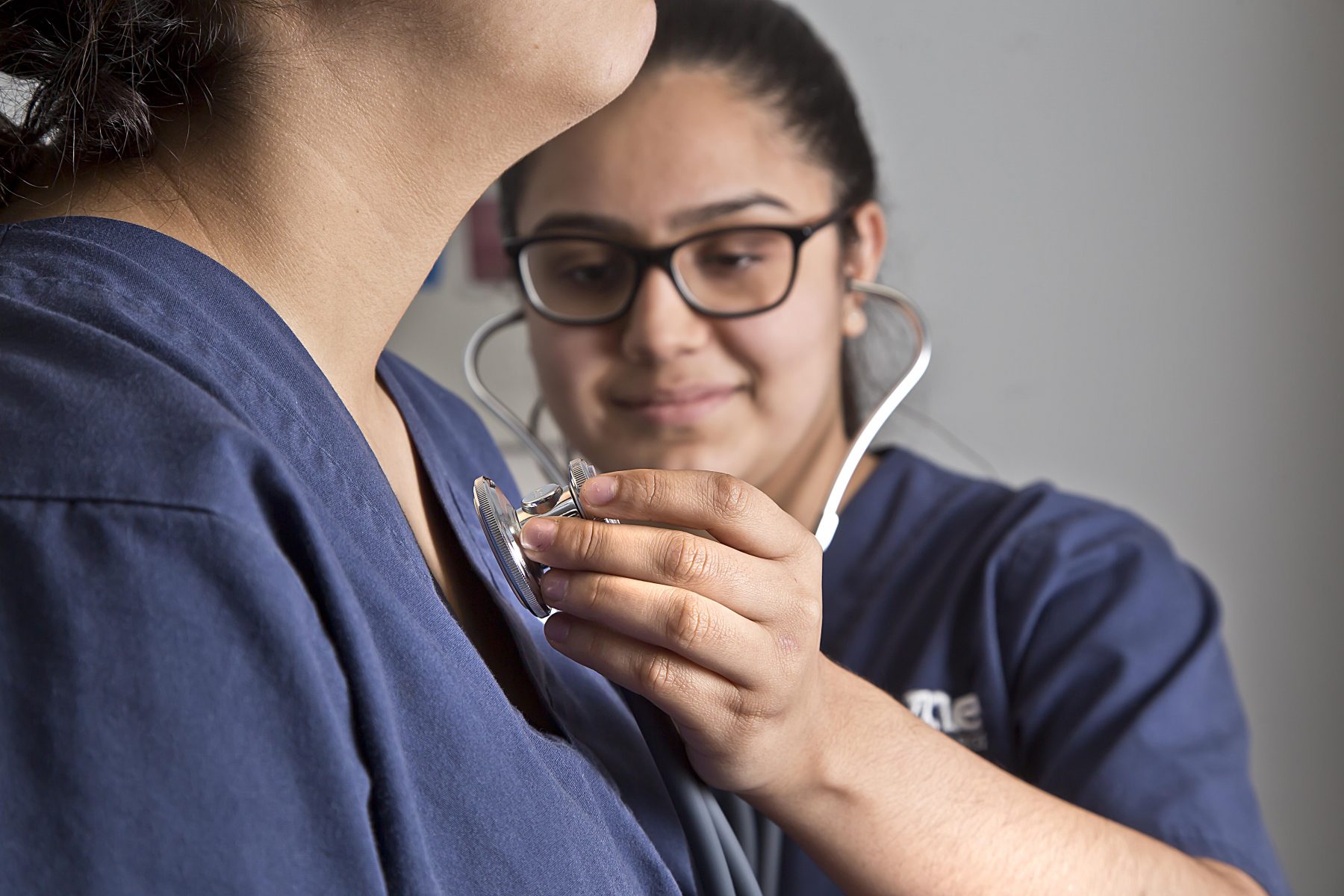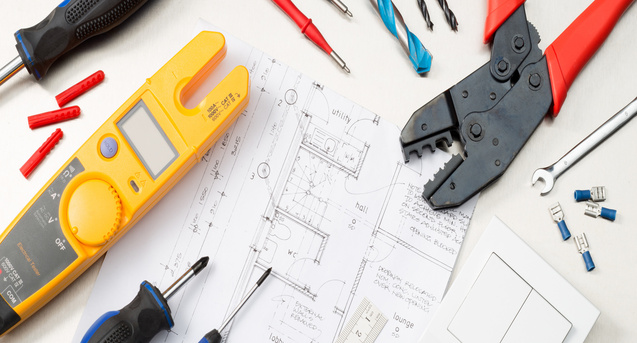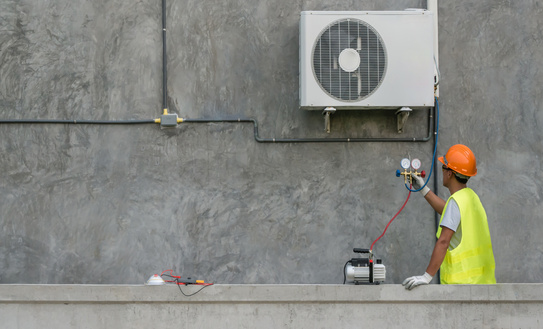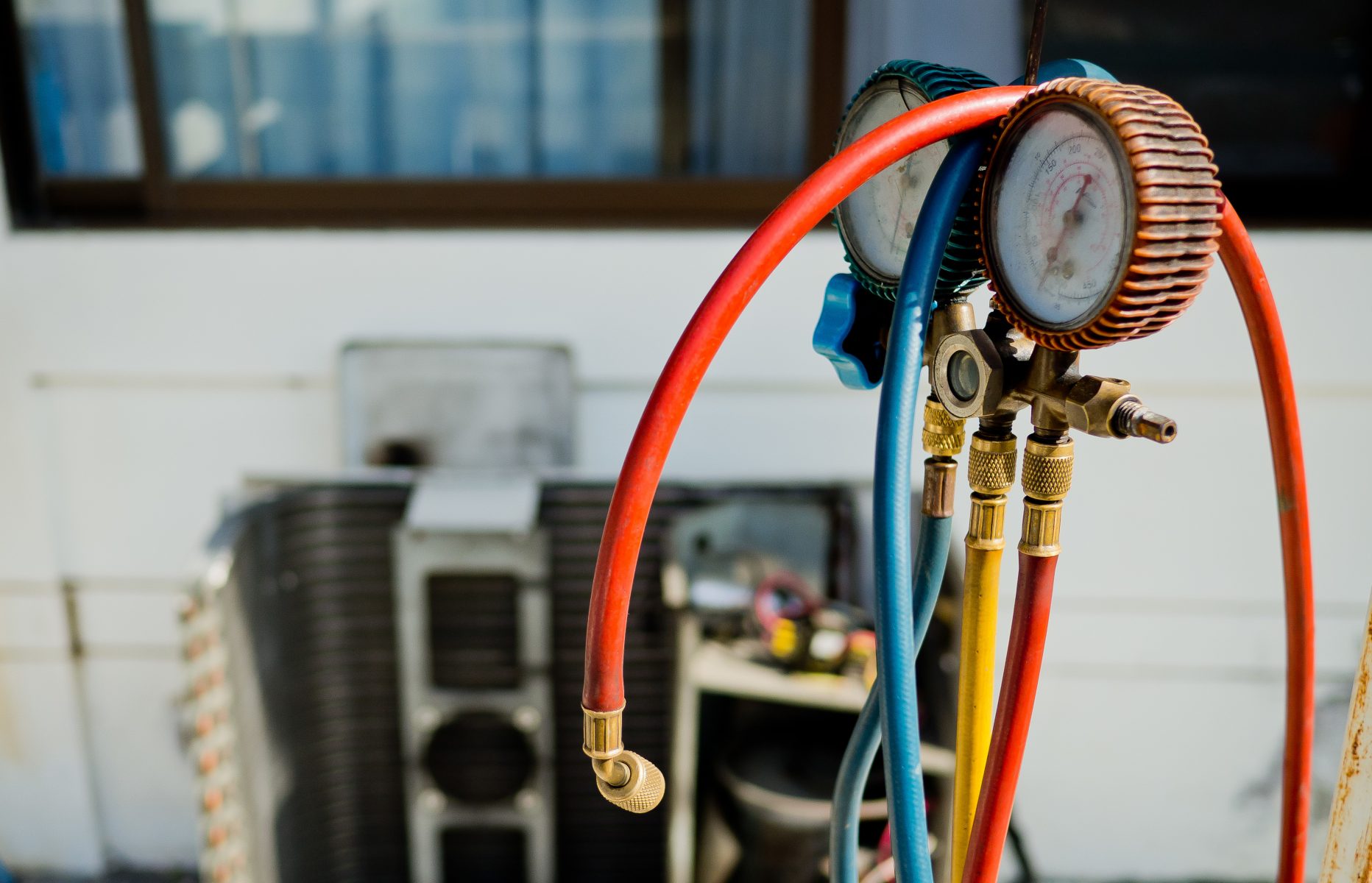Medical assisting is an in-demand healthcare occupation that is vital to the day-to-day operation of healthcare facilities across the country. If you’re considering a career as a medical assistant, you likely have questions about the education and training involved, as well as the everyday tasks of the job. Here are some questions to ask before committing to medical assistant school, along with some helpful information:
DM19_221_Coyne_MA_questions_InfographicCoyne College
Alumni Spotlight: Walter Arzet – HVAC
Walter Arzet exercised due diligence before deciding to go into the Heating Ventilation Air Conditioning industry. It paid off, though, because he found his true passion – and lifelong career.
Arzet, a 1986 graduate of Coyne College in Chicago, was undecided about what to do after high school. “I talked to people, and I went to the schools: three different schools, three different trades,” he says. “You want to get to the source of why people are doing it or don’t want to do it.” That meant talking to people who were working in the field before enrolling in Coyne’s HVAC program.
What to Expect from a Medical Assistant Certification Exam
Certification can be a valuable credential for medical assistants. Not only is it an indicator of your skills and knowledge, it can also help you stand out among other candidates and appear more marketable to future employers. You may be required to earn certification depending on your employer.
There are a few different bodies that offer medical assistant certifications, such as the National Center for Competency Testing and American Association of Medical Assistants (AAMA). For the purposes of this blog, however, we’ll focus on the RMA exam issued by the American Medical Technologists (AMT).
Passing the RMA won’t be easy. It will test your general knowledge, administrative knowledge and clinical knowledge of the medical assisting profession. Here are some helpful tidbits to know for when you’re preparing to earn your RMA certification from AMT.
Exam structure
AMT’s RMA exam consists of anywhere between 200 and 230 questions, all multiple choice. The questions on the exam are weighted depending on their difficulty. It is also in your best interest to eliminate options you know to be incorrect, as picking an answer that is the second-best will still help your score more than the worst answer.
For example, if the answer to a question is “femur” and you choose another leg bone, perhaps “tibia,” you are likely to be rewarded more than someone who answers “scapula.” The scoring system can be confusing, so you’ll want to read up on it prior to taking the exam. For this, AMT’s Candidate Handbook is a great resource.
Exam timing
The AMT’s RMA exam has a time limit of two hours. With at least 200 items on the exam, you’ll have to pace yourself to make sure you have enough time to answer them all. Taking practice exams is a good way to learn how to effectively budget your time over the course of the exam. Managing your time spent on questions will help you save more time for the harder ones while you breeze through those you know like the back of your hand.

Subject matter
AMT’s RMA exam is designed to test your general knowledge of medical assisting across many areas of the discipline. The exam covers four major subject areas: anatomy and physiology, administrative medical assisting, clinical medical assisting and clinical patient interaction.
The RMA exam is not divided into subjects, so you need to be prepared for a question from any of these categories at any time. You can find a more complete rundown of material that is on the exam in AMT’s RMA exam outline.
Study resources available
AMT offers an abundance of resources to help guide you in your studies for the RMA exam. These include a list of suggested readings and references, as well as online review courses that are available for a fee.. AMT’s website is full of other helpful study resources as well. These handy resources can help you make the most of your time spent preparing to ace the RMA exam and earn your RMA certification.
Practice exams
Speaking of resources, some of the most helpful ones available are online practice exams. These are also available through the AMT for a fee. Medical assistant practice tests give you a feel for what the real exam will be like and can help you figure out which subject areas you need to focus on most in your preparation. Depending on your medical assisting school, practice exams may be available for free or at a discounted rate.
Before you get ready to take the RMA, you need to learn the skills. There’s no better place in Chicagoland to do that than Coyne College.
Launch your medical assisting career at Coyne
Coyne College’s Medical Assistant program is your first step to becoming a medical assistant. Coyne’s medical assisting program will equip you with the necessary skills and knowledge you need to succeed in a booming profession.
You’ll take courses in subjects like medical terminology, pharmacology and medical billing, taught by our experienced instructors. We’re so dedicated to your success that our curriculum includes a 6-week portion on electronic health records and a required externship.
You can complete our program in as soon as 54 weeks, meaning you can be ready for an entry-level role in a little over one year. We offer day options at our campus in the heart of the Chicago Loop.
Learn more about the medical assisting program at Coyne College in Chicago by calling us at 800-720-3990 or visiting coynecollege.edu today!
Electrical Safety Checklist for Your Home
Electricity in homes has become fairly essential to our everyday lives. For all of its advantages and capabilities, electricity in the home can be quite dangerous. Many dangers relating to electricity in homes are related to the potential for it to start fires. That’s why it’s crucial to take the proper safety precautions. Using this electrical safety checklist can help protect your home, your family and yourself while reaping the benefits of electricity and everything it powers.
Make sure your alarms are working properly
As noted earlier, fires are perhaps the biggest threat electricity poses to your home. That being said, smoke alarms are essential to your home’s fire safety. Make sure your smoke alarms have healthy batteries and replace them if necessary. It’s also a good idea to test them once a month and change the batteries every six months, according to the U.S. Fire Administration.
Use surge protectors
If you’re not doing so already, you should use a surge protector to connect various appliances to their power outlet. The surge protector keeps your appliances safe by diverting excess voltage to the outlet’s grounding wire in the event of a power surge, as is the case of lightning striking a power line. Surge protector power strips also allow you to plug more than a single device into an outlet. It’s important to not overdo it, though.
Check cords, outlets and light bulbs for damage
Frayed electrical cords are major fire hazards. Take a look at any extension cords you may be using to ensure they are working and not damaged. While inspecting extension and appliance cords, be sure to note the condition of your home’s outlets as well. You’ll also want to make sure the cords aren’t exposed to any water, which is also a safety hazard. Check all the light bulbs in your home, too, and double-check that they’re the right wattage.

Replace filters
One of the primary causes for reduced circulation in a house is a dirty air filter. Restricted airflow results in your heater or air conditioner having to work harder to heat or cool your house. The harder or more often they run, the more you’ll be paying for them on your electric bill. You’ll also want to clean or replace the filters on your refrigerator and range exhaust hood. Cleaning your dryer duct is crucial as well, as it’s very easy for too much lint to catch fire.
Check your appliances
Conduct an inspection of your home’s appliances to make sure they’re all working correctly. Ones that aren’t functioning properly or won’t turn on could be an indication of faulty electrical components. There may also be dust or debris that is hindering their function, as is commonly the case with refrigerators and dusty refrigerator coils. You’ll also want to unplug any appliances that aren’t being used. Not only will it reduce the likelihood of an electrical fire, but it’ll also cut down your electric bill.
Schedule an inspection
When in doubt, have a pro check it out. If you’re uncertain about the state of your home’s electrical wiring, don’t hesitate to have a professional electrician perform an inspection. They are able to tell you if everything is running smoothly and if there is a problem, they can help you fix it sooner rather than later. Sometimes early detection can be the difference between a simple inexpensive fix and a costly home repair.
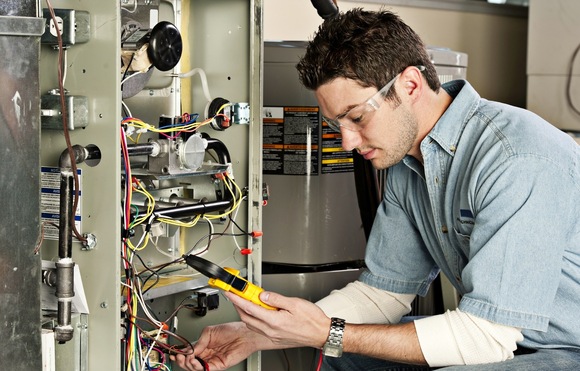
These tips can go a long way toward making your home safer and prevent electrical fires.
How would you like to help keep families and homes safe by using electrical skills and knowledge to conduct inspections? At Coyne College in Chicago, you can train to become a field-ready electrician.
At Coyne College in Chicago, you can choose from two electrical work training programs: Electrical Construction and Planning and Electrical Construction and Maintenance. In either program, you’ll learn the essentials of electrical work in a setting dedicated to your individual success. Coyne College’s highly knowledgeable instructors have years of practical, real-world experience and are eager to help you make the most of your education.
As a student in Coyne College’s electrician programs, you’ll gain comprehensive knowledge about relevant subjects, such as, such as:
- Electrical and Electronic Principles
- Electrical Test and Equipment Safety
- Electrical Construction – Residential
- Electrical Theory and Applications
In addition to flexibility and quality instruction, Coyne College’s career services department can help you with job placement, including apprenticeships. Coyne College has more than 120 years of experience in helping transform students with dreams into qualified, skilled trade professionals. With day and night options available at our Chicago Loop campus, we’re committed to helping you fit a skilled trades education into even the busiest of schedules.
Discover everything Coyne College has to offer and begin your journey to a new career today by logging on to CoyneCollege.edu or call us at 800-720-3990.
HVAC Technician Career Facts and Forecast
An HVAC technician career is important as there’s no getting around the fact that people need HVAC systems to maintain comfortable environments indoors. This means talented individuals who work on HVAC systems, HVAC technicians, are and will continue to be important members of the labor force. Here are some quick facts about HVAC technicians and some insight as to what the future holds for the profession.
At Coyne College in Chicago, you can earn a HVAC-R diploma in less than a year. At the end of the program, you’ll be equipped with the technical skills and knowledge to begin your career in the HVAC industry thanks to our knowledgeable instructors. To learn more about all Coyne College has to offer, visit us at coynecollege.edu.
HVAC Technician Career Facts Coyne College5 Common HVAC Issues in Chicago
As with other home appliances, HVAC systems are not immune to problems over their lives. Some problems you may experience are more common than others. There are some that are minor, which you may be able to troubleshoot yourself, while others may require major repairs or even replacement after having a professional HVAC technician perform an inspection. Here are some of the most common issues people in Chicagoland experience with their HVAC systems, along with some possible solutions.
Impaired airflow
If you’re not feeling enough hot or cool air coming through your vents, there’s likely something that is blocking it. One of those things could be a dirty filter. Make sure to change your filter in accordance with the manufacturer’s guidelines or every three months. If you have a reusable filter, be sure to wash it regularly, about every three months or so, depending on the amount of dust in your home. You’ll also want to make sure all of the registers are open. If they’re not, the air won’t be able to circulate into rooms and back through to your HVAC system.
Running too much or not enough
If your HVAC system is running too much or not enough, this may indicate a problem.If it’s running too much, you could be experiencing a dirty filter that needs to be washed or replaced. There might also be dust or debris in your vents that is preventing the air from heating or cooling rooms. An HVAC system that is running too much isn’t good for your wallet, as it will increase your electric bill.
A furnace or air conditioner that is not running enough is likely a problem with the unit if the thermostat is working properly. In that case, it’s a good idea to call an HVAC technician to take a look and evaluate the situation before determining the best course of action. Their expertise can help resolve issues of inconsistent temperature in your home.

Pilot light burning yellow
Your pilot light should always burn blue. If it is burning yellow or another color besides blue, you have a problem. Yellow is the color you have to watch for, as it’s an indication that the flame is contaminated by carbon monoxide. You should have an experienced HVAC professional come to your home to troubleshoot the issue. It’s also vital that you find the source of the carbon monoxide immediately.
Problems with thermostat
If you’re having trouble with your thermostat, there are some basic steps you can take to troubleshoot the problem. The first thing you’ll want to do is check that it’s sufficiently powered. If it runs on batteries, try replacing the batteries. Most modern thermostats are connected to the electrical wiring of the building, so you’ll want to check the status of the breaker it’s connected to if that’s the case. If it’s on and running, make sure the settings are adjusted appropriately to your liking and nothing is askew. If issues persist, you’ll need to have an HVAC technician troubleshoot the problem.
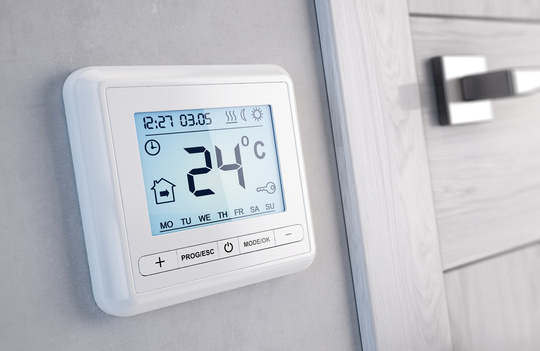
Excess water
The presence of excess water in or around your furnace or air conditioner is never a good sign. It’s typically an indication of a crack in the pipe that runs off the condensation into the ground. Water inside your HVAC unit is arguably worse, as the water can damage other parts of the system and can indicate a need to replace the coolant and the unit as a whole.
Would you like to make a career of troubleshooting issues with HVAC systems? With a certificate in HVAC Refrigeration from Coyne College in Chicago, you can make that dream a reality.
Learn Heating and Cooling at Coyne College
Coyne College’s HVAC-R program is designed to teach you the skills and knowledge you need to begin your career as an HVAC technician. As a student in Coyne’s program, you will actively engage in learning the finer points of the occupation. Some of the classes in the HVAC-R curriculum include:
- Introduction to Mechanical Refrigeration Systems
- Air Conditioning, Electric Heat and Heat Pumps
- Introduction to Commercial Controls
- Gas Heating
- And more!
You’ll get a mix of textbook and hands-on learning from instructors who have valuable experience in the HVAC field. They’ll teach you the whys and the hows of HVAC work to ensure you have a comprehensive understanding by the time you graduate.
Coyne College has more than 120 years of experience helping aspiring skilled trade professionals in Chicago build the foundation of their careers. With day and night class options available at our Chicago Loop campus, we do our best to help you fit a skilled trades education into your schedule.
To schedule a visit, contact an advisor or request more information about the program, call 800-720-3990 or visit https://www.coynecollege.edu/contact.
HVAC-R Program Alumni Spotlight: Rafael Cardenas Jr.
HVAC-R graduate Rafael Cardenas Jr. speaks on his experience at Coyne College and provides advice to prospective students. If you like working with your hands, have a mechanical aptitude and are looking for a career with a tremendous future, becoming a heating, air conditioning and refrigeration technician could be a perfect fit. As the world shifts to an increasingly energy-efficient, technology-based HVAC-R systems, and a construction industry driving new commercial and residential construction, will fuel the need for qualified technicians, installers and mechanics.
Hear more from Rafael and for more information on our HVAC and Refrigeration program visit us at https://www.coynecollege.edu/ or give us a call at 800.720.3990.
Raphael: My name is Raphael Cardenas Jr. I went to Coyne for the HVAC program. I’m a pretty good worker with my hands I would say. I just picked a different career to follow that had something do with my hands still. It was HVAC that I chose. I looked up different places and a lot of good reviews from Coyne. My brother-in-law actually attended Coyne and my cousin attended Coyne. Both of them are doing pretty good, so I figured if they could do it, I can do it.
Typical day, those night classes start at six. There was some classroom work, maybe getting over what the plan for the day was going to be. Then a lot in the labs, actually working on hands on with all the materials, all the stuff you’re going to learn. Most challenging part of classes is probably getting to class. That was really the most challenging part. Making it every day, trying to be every day. Especially working full time, trying to make it to class every day was the challenging part.
As far as class, I wouldn’t say it was challenging. Unless you push yourself to do it, or you’ll want to do it. You don’t pay attention, you’re really wasting time, but pay attention to the labs. Hands on stuff because that’s really going to help when you really out there in the field. You’re going to remember back to what you did back in class and it will really help you out.
6 Things You Didn’t Know About Medical Assistants
You may not know it, but you’ve likely had many interactions with medical assistants over the course of your life. Medical assistants work alongside doctors and nurses in a variety of healthcare settings. From doctors’ offices to immediate care clinics and hospitals, medical assistants play important roles in making sure healthcare facilities run smoothly. These are six things you didn’t know about medical assistants.

Jack-of-all-trades
Medical assistants are among the most versatile healthcare workers. They are trained to perform both administrative tasks, such as scheduling appointments and maintaining patient records, and patient care-related duties, like taking blood pressure and helping doctors with patient exams. A medical assistant’s specific responsibilities depend on the size of the practice and the needs of the doctors and the facility. In some cases, medical assistants may be permitted to administer medication. In all cases, medical assistants help run the office.
Different medical assisting specialties
A medical assistant’s job will be different depending on the kind of practice in which they work. For example, a podiatric medical assistant is likely to take molds of feet, which may then be used to create custom orthotics. A medical assistant who works with an oncologist would likely perform tasks associated with treating cancer. In a more general sense, some medical assisting roles are more focused on the administrative side, while others primarily handle clinical tasks. Becoming a medical assistant presents you opportunities to work in different settings and discover what kind of medical assisting you like best.
Constantly changing
As with other jobs in the healthcare industry, the roles and responsibilities of medical assistants are always changing. For example, electronic health records (EHRs) are getting closer to becoming universal, meaning medical assistants will have to stay up-to-date on how to properly maintain patient data. There are likely other medical innovations in the pipeline that will also affect medical assisting in the near future. There are also changes that come with starting a new job, perhaps in a different specialization or a facility with different needs from the position. Adaptability is important as a medical assistant.
Fast-growing profession
The healthcare industry is booming, and is anticipated to continue growing in the near future. Medical assisting is among the fastest-growing professions in the country. The Bureau of Labor Statistics (BLS) projects that the number of medical assistant jobs will increase 29 percent through 2026, compared to 2016’s total. This is due in part to the increased need for healthcare services, preventative and otherwise, among baby boomers. This need has resulted in more healthcare facilities that treat the ailments associated with aging.
There’s a professional association
The American Association of Medical Assistants provides resources to individuals in the medical assisting profession. Such resources include networking, legal protection and more. They also administer a certification exam (RMA) that can help you be more marketable in the eyes of employers. There are other bodies that offer different certification credentials, and many employers prefer to hire certified medical assistants.
Other educational opportunities
Working as a medical assistant can provide a sturdy foundation for your career in the healthcare industry. Much of what you learn in a medical assistant training program or working in a practice can help you should you choose to go back to school to pursue a degree for a higher position in healthcare, such as a nurse practitioner. Working in the field as a medical assistant can also help you establish connections that can help you find employment further down the road.
Are you looking to break into the healthcare industry with a well-rounded set of practical skills? Studying to become a medical assistant could be the right path for you. There’s no better place to study medical assisting in Chicagoland than Coyne College.

Launch your career in healthcare at Coyne College
Coyne College’s Medical Assistant program thoroughly prepares you to enter the healthcare field as a medical assistant. You will gain the necessary skills and knowledge to succeed as a medical assistant. Some of the topics covered in the program’s curriculum include:
- Medical Terminology
- Pharmacology
- Anatomy and Pathophysiology
- Basic Insurance and Billing
- And more!
Coyne’s highly knowledgeable instructors have years of meaningful experience in the workforce. Coyne College’s program also features a six-week portion dedicated to EHRs.
All medical assisting students are required to complete an externship following the completion of all of the necessary coursework. Following the completion of the program and your externship, you will be ready to enter the workforce as a medical assistant in any number of healthcare settings.
The program can be completed in as little as 54 weeks, allowing you to be ready for meaningful work as entry-level role medical assistant in just over one year. Day options are offered at the Coyne College campus in the heart of the Chicago Loop at the intersection of State and Madison Streets.
Coyne’s students receive a well-rounded medical assistant education that provides them with a toolbox for success in the healthcare industry.
To learn more about Coyne College’s Medical Assistant program, call us at 800-720-3990, or fill out the online form, and an admission representative will contact you.
The Future of Skilled Trades Programs
In the coming years, the United States is expected to experience a shortage of skilled workers. Many of the current workers in fields such as electrical work, plumbing and heavy equipment operation are baby boomers who are approaching retirement age. What’s left in their wake will likely be a skill gap. This presents an excellent opportunity for students who want to make a living in these fields as opposed to an occupation that requires a four-year degree. Let’s take a quick look at the outlook for two such professions.
HVAC Technicians
HVAC technicians spend their days installing, repairing and maintaining HVAC systems. Currently, the Bureau of Labor Statistics (BLS) anticipates a 15 percent increase in the employment of heating, air conditioning and refrigeration mechanics and installers through 2026. The BLS attributes this rise in part to the push for more energy-efficient and environmentally friendly heating and cooling systems. HVAC technicians will play a significant role in creating a more sustainable tomorrow.
People rely heavily on HVAC systems to maintain comfortable temperatures in their homes, especially in warmer climates where the air conditioner is likely to be running most of the year. It’s important to have a well-trained workforce of HVAC technicians available for when heating and cooling problems arise.

Electricians
Electricians keep the lights (and everything else that uses electricity) on. They install, maintain and repair electrical wiring and components in buildings. Like HVAC technicians, employment of electricians is projected to increase in the coming years. According to the BLS, there’s expected to be a 9 percent spike in electrician jobs through 2026 relative to 2016.
Also like HVAC technicians, electricians are and will continue to be part of the implementation of greener technology. Solar panels are becoming more common in residential settings. Wind and other forms of renewable energy also require the know-how that electricians bring to the table in order to be harnessed effectively.
The BLS suggests that electricians who can do many things well will have more success in the workforce. Seeing how much we rely on electricity for so many things we do in our personal and professional lives, we will need more electricians to keep things working.
We’ve established that there’s a demand for skilled trades workers. So how can you capitalize on the current demand for skilled trades workers? That’s easy. All you need to do is enroll in a program that teaches the trade you’re interested in.

Start your Future at Coyne College
Skilled trades training programs are commonly offered at trade schools and community colleges. Let’s take, for instance, Coyne College in Chicago. Coyne College offers training programs in both HVAC refrigeration and electrical work (two, actually: Electrical Construction and Planning and Electrical Construction and Maintenance). In each of the programs, students gain a fundamental understanding of the trade and get immersive hands-on learning that will help prepare them for entering their field. Programs are taught by professionals who have years of experience under their respective belts. They can pass tips on to you that can only be learned from working in the field.
What’s more is that the programs at Coyne College Chicago are shorter than those at traditional colleges and universities. For example, Coyne’s HVAC Refrigeration program can be completed in a little as 42 weeks. This can allow you to take advantage of the growing demand and excellent earning potential that skilled trades work presents. Additionally, Coyne College offers both day and night options so you can fit a skilled trades program into your schedule.
In short, the future of skilled trades (and the programs that teach them) is bright. Find out for yourself all that Coyne’s programs have to offer by calling 800-720-3990 or visiting our homepage at https://www.coynecollege.edu/.
Skilled Trades Careers Can Ease Transition to Civilian Life
In honor of this past Memorial Day, we’d like to take a moment to share with you our commitment to men and women in uniform. At Coyne College, we know the transition to civilian life after years of military service can be a challenging one. Fortunately, a career in skilled trades can help smooth it out. We’re dedicated to providing top-tier training programs that can help veterans establish meaningful, in-demand careers.
In many ways, the skilled trade professions embody similar traits to being in the military. For example, in electrical construction, you have the opportunity to work with other electricians to supply the wiring and conduit needed to power a building. Skilled trades work also requires using highly specialized skills to get the job done. While it may take time to foster a strong bond with your fellow trades workers and the task may not be as high-stakes as it is fighting to preserve our freedom, these aspects of skilled trades jobs can help you get acclimated to civilian life once more.
Coyne College offers six different skilled trade programs that provide training in electrical work, HVAC and refrigeration, as well as select allied health professions. Our programs include:
- HVAC Refrigeration
- Electrical Construction & Planning
- Electrical Construction & Maintenance
- Medical Assistant
- Medical Billing & Coding Specialist
- Pharmacy Technician
Many of these fields are expected to experience continued growth in employment in the coming years, according to the Bureau of Labor Statistics (BLS) projections. At Coyne, you’ll receive stellar instruction from professionals with valuable real-world experience.

You’re also not alone once you’re in classes at Coyne College. We offer academic assistance to help you stay on pace to graduate, should you need it. Additionally, our Career Services team can help you navigate the job search process with resources such as resume help, mock interviews and more. Be sure to check out our Resource Center page to learn more.
Some of Coyne’s programs can be completed in as little as 42 weeks from your start day. This means you’ll be able to get to work and apply your skills sooner than you would by enrolling at a traditional four-year college or university. With day and night class options available, you can fit a skilled trade’s education into your schedule.
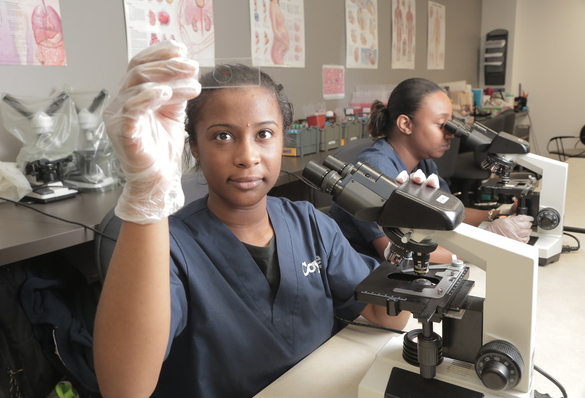
Paying for training to improve your return to civilian life shouldn’t cost a fortune for those who have already made the greatest sacrifice. A variety of scholarships are available to veterans, including the Military Award Program (MAP) provided by the Imagine America Foundation – Adult Program. You can also apply for federal aid using the Free Application for Federal Student Aid (FAFSA).
For more information or to speak with one of our helpful admissions representatives, call us today at 800-720-3990.




